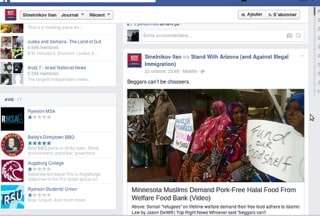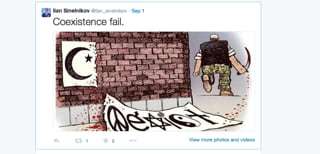The Volokh Conspiracy
Mostly law professors | Sometimes contrarian | Often libertarian | Always independent
Is excluding a student activist from a university job based on his political activity a crime in Minnesota?
The University of Minnesota collects mandatory "student services fees," which it then distributes to support various student group events and projects. A Student Services Fee Committee decides which groups get funds, and is supposed to do that on a viewpoint-neutral basis (see Board of Regents v. Southworth (2000)). As best I can tell (mostly from the official application for committee membership), prospective student members are chosen in the first instance by university staff, but then the undergraduate student government and the graduate student government are entitled to remove several prospective members, and thus prevent them from being hired. Members who are chosen are paid $750 to $1000 for 60 to 80 hours of work.
But there's now a controversy: pro-Israel student activist Ilan Sinelnikov is apparently being removed by the graduate student government because of his activism (though the decision is apparently not yet final). According to The Algemeiner,
"I got accepted to the job, I got hired, in 4th place out of 21 other candidates," for the role of financial administrator on the student services committee, [said Sinelnikov]…. The 22-year-old Rehovot native, and the others were then to then be voted on by the undergraduate Student Association, and then by the graduate body, to receive final approval….
Enter Damien Carriere, the student representative to the board, and a well-known BDS (Boycott, Divest, Sanction) campus activist.
"As soon as he heard that an Israeli - who established the Students Supporting Israel (SSI) group - got the position, he started a poisonous campaign against me," Sinelnikov said….
"We're talking about hundreds of emails; we're talking about calling SSI a 'hate group,' and comparing us to the Ku Klux Klan, and even saying that my English was not good enough to serve on the committee," Sinelnikov noted….
"[Ilan Sinelnikov] is a member of a hate group (SSI) and I think he comes in with a fishy agenda," Carriere wrote in an email quoted on Wednesday in Campus Reform….
According to the Campus Reform post,
Carriere explains in the emails that SSI is a hate group because the students belong "to a certain ideology which is present among some citizens of that state that has been refusing rights to minorities outside of the recognized borders of that country."
In a follow-up email, Carriere said that he would label Christian Crusaders for Christ a hate group because it "is named after a bloody and inherently racist episode in European history."
"The term crusade is considered by many as offensive because it refers to the will of chasing the Muslims from their land by mean [sic] of war," Carriere wrote.
The official rejection e-mail sent to Sinelnikov apparently states,
I am writing to let you know that GAPSA [the graduate student government] voted, in a vote of 14-6 (with 11 abstentions), to remove you from the SSFC Slate. You were removed based on the rationale that you "have not demonstrated an ability to remain impartial." Two handouts (screenshots from your Facebook page) were distributed to GAPSA membership - one with a quote of "Beggars can't be choosers" over a story that posted October 22, and the other from September 1st with a quote of "Coexist Fail."
Here are what appear to be the relevant screenshots:


Now this exclusion from a government job (however modestly paid) based on Sinelnikov's speech might well violate the First Amendment (see Pickering v. Board of Ed. (1968)), which applies to decisions not to hire as well as decisions to fire, see (Elfbrandt v. Russell (1966), Keyishian v. Board of Regents (1967), and Rutan v. Republican Party (1990)). For more on the Pickering balancing test, see here.
But I wonder whether the more serious problem - if the facts are as the Algemeiner report suggest - might have to do with a Minnesota criminal statute, Minn. Stat. Ann. § 10A.36 (emphasis added):
An individual or association must not engage in economic reprisals or threaten loss of employment or physical coercion against an individual or association because of that individual's or association's political contributions or political activity. This subdivision does not apply to compensation for employment or loss of employment if the political affiliation or viewpoint of the employee is a bona fide occupational qualification of the employment. An individual or association that violates this section is guilty of a gross misdemeanor.
This is one of many statutes, present to some degree or another in about half the states, that protect even private employees from employer retaliation for political activity; and it certainly applies to public employment (and seemingly to contracting decisions and not just employment). The potential danger to the graduate student government officials, if their decision leads to Sinelnikov's, is this:
- Removing someone from a list of people who would be hired for a job is an "economic reprisal[]."
- Public advocacy of support for Israel seems like "political activity." Indeed, Gay Law Students Assn. v. Pacific Tel. & Tel. Co. (Cal. Supreme Ct. 1979), interpreted a similar California statute to cover the espousal "of a cause" (and not just a candidate or a party), including the cause of gay rights - the cause of preserving support for Israel and opposing attempts to divest from Israel and otherwise pressure or punish Israel would likewise be a "political activity." And this tracks common terms such as "political speech," which has generally been used in First Amendment law to refer to speech on public affairs matters, and not only speech related to elections. On the other hand, the statute does appear in the statutory chapter dealing with election campaigns, and was enacted as part of a election reform act, so maybe "political" here was intended to just refer to election campaigns. Also, as I note on pp. 313-14 of this article, a couple of federal trial court decisions in South Carolina took a different view, limiting "the exercise of [constitutional] political rights and privileges" (the South Carolina statutory language) to matters more closely linked to elections.
Still, a Fourth Circuit appellate panel (later reversed on procedural grounds) disagreed with those district court decisions, reasoning that the display of a Confederate flag off the job would indeed be "political" enough to be covered by the statute. And even a statute appearing in an election reform package may be seen as covering "political activity" in the broad sense of the term, since debates about issues (such as support of Israel or the influence of Islam in America) are often highly relevant to political campaigns. When we vote on a candidate, our vote is influenced not just by what was said by or about the candidate, but also by our views on the issues that the candidate has acted on and spoken about. (Rightly or wrongly, this may be especially relevant in Minnesota, both because Rep. Keith Ellison from Minnesota is Muslim, and has unsurprisingly spoken on Islam-related issues, and because of Minnesota controversies involving Muslim Somali immigrants, such as the one referred to in one of Sinelnikov's Facebook posts.)
- The question then would be whether "political affiliation or viewpoint of the employee" is a "bona fide occupational qualification" for the job. In some situations, it surely would be - the Democratic Party, for instance, should surely be free to dismiss a spokesperson or a campaign strategist who had publicly supported the Republicans, and likewise for many other advocacy groups. But I doubt that this would be so here: the Student Services Committee is not supposed to be a political group, and indeed is supposed to distribute funds in a viewpoint-neutral way.Now perhaps one could argue that the statute should allow employers to enforce a no-politics qualification for a job, for instance when a newspaper insists that its reporters stay out of politics. (See Nelson v. McClatchy Newspapers, Inc. (Wash. 1997), which held that a newspaper has a First Amendment right to impose such a policy, even in the face of a statute that categorically bans employer retaliation for employee activity related to election campaigns or parties.) The statute doesn't seem to literally cover such situations where lack of political action is a bona fide occupational qualification, but one can imagine its being read this way.But I think this rationale would support an exclusion of Sinelnikov only if in fact there was a policy reflecting such an understanding of the "occupational qualification" for the job, whether the policy is written or a consistently enforced custom. Have politically active students indeed been consistently excluded from the Student Services Committee? If not, then I don't think the "bona fide occupational qualification" language would justify any exclusion of Sinelnikov on the grounds of supposed lack of "impartial[ity]" "demonstrated" by his political activity.
I do not think that Damien Carriere or others who called for the removal of Sinelnikov from the appointment list could be criminally punished just for their advocacy, even if the removal of Sinelnikov from the list was a crime. Even advocacy of criminal conduct is usually constitutionally protected (see Brandenburg v. Ohio (1969)).
But, if I'm reading the Minnesota statute right, it may be a crime for student government officials to actually vote to exclude Sinelnikov. There, they aren't speaking - they are exercising governmental power to engage in a (potentially illegal) "economic reprisal" against a person. And just as an administrative board and its members can be sued for discriminatory refusals to hire someone (though public advocates of such discrimination can't be sued for their advocacy), so the members can be prosecuted, I think, for refusals to hire that are outlawed under state law. (For more on the lack of First Amendment protection for government officials' legally operative votes, as opposed to their speech, see Nevada Comm'n on Ethics v. Carrigan (2011); and note that administrative officials lack many of the special immunities that state legislators possess.)
I'm not certain that laws such as this Minnesota statute are a good idea, especially when they apply to private employment and not just government employment, and especially when they impose criminal punishment. Nonetheless, rightly or wrongly, Minnesota does have such a law.
All this thinking is just tentative, because the facts of the Sinelnikov controversy aren't entirely clear, the term "political activity" hasn't been authoritatively interpreted by Minnesota courts, and the prospective defendants haven't had a chance to articulate a possible theory of why "the political affiliation or viewpoint of the employee is a bona fide occupational qualification of the employment" in this instance. If you have some facts or legal authority that I've missed, I'd very much like to hear about it. But it seems at least plausible that, if the removal of Sinelnikov from the appointment list actually takes place, anyone who took the legally effective steps towards that removal based on Sinelnikov's "political activity" might be seen as having violated the Minnesota statute.


Show Comments (0)